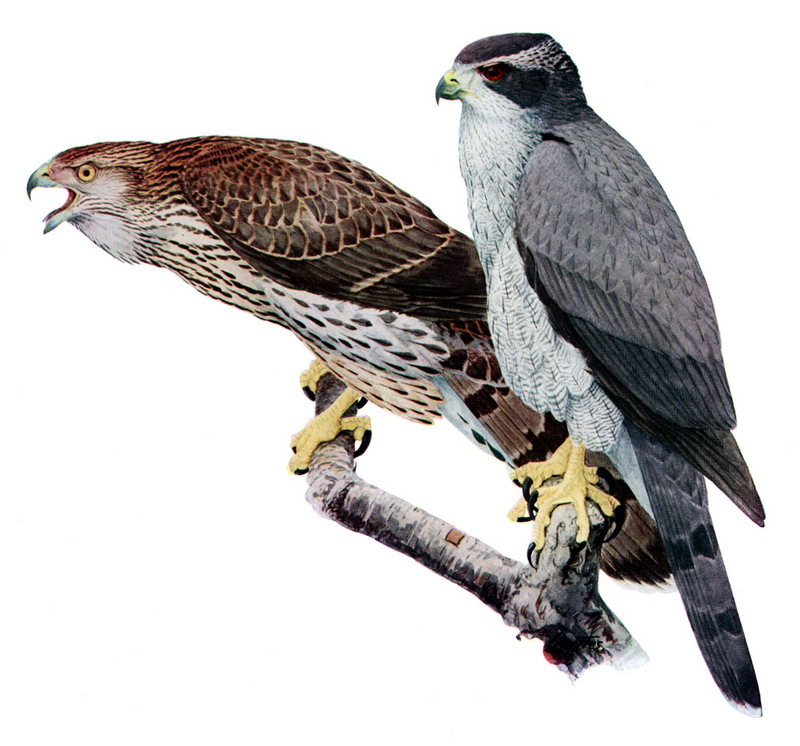Goshawk
From Wikipedia, the free encyclopedia
Order: Falconiformes
Family: Accipitridae
[Photo] Northern Goshawk, Accipiter gentilis, juvenile (left) and adult (right), offset reproduction of watercolor. Source Birds of New York (New York State Museum. Memoir 12), Albany: University of the State of New York. Plates by Fuertes later reproduced in Birds of America (1917?) by Thomas Gilbert Pearson (1873-1943) et al. Date 1910-1914. Author Elon Howard Eaton (1866-1935, author), Louis Agassiz Fuertes (artist, 1874-1927)
The Goshawk (Accipiter gentilis; from OE. g??shafoc 'goose-hawk') is a medium-large bird of prey in the family Accipitridae, which also includes other diurnal raptors, such as eagles, buzzards and harriers.
It is a widespread species that inhabits the temperate parts of the northern hemisphere. In North America, it is called the Northern Goshawk. It is mainly resident, but birds from colder regions of north Asia and Canada migrate south for the winter.
Appearance
The Goshawk is the largest member of the genus Accipiter. It is a raptor with short broad wings and a long tail, both adaptations to manoeuvring through trees in the forests it lives and nests in. The male is blue-grey above and barred grey below, 49-57 cm (19"-22") long with a 93-105 cm (37"-41") wingspan. The much larger female is 58-64 cm (23"-25") long with a 108-127 cm (42"-50") wingspan, slate grey above grey below. Males of the smaller races can weigh as little as 630 grams (1.4 pounds), whereas females of the larger races can weigh as much as 2 kg (4.4 lbs). The juvenile is brown above and barred brown below. The flight is a characteristic "slow flap ??? slow flap ??? straight glide".
In Eurasia, the male is sometimes confused with a female Sparrowhawk, but is larger, much bulkier and has relatively longer wings. In North America, juveniles are sometimes confused for the smaller Sharp-shinned Hawks and Cooper's Hawks, but the size again is a distinctive feature of the goshawk.
Food and hunting
This species hunts birds and mammals in woodland, relying on surprise as it flies from a perch or hedge-hops to catch its prey unaware. These are usually opportunistic predators, as are most raptors, but the most important prey species are squirrels (especially less agile ground squirrels), galliforms, piciforms, and passerines (mostly crows, pigeons and seagulls). Other raptors, up to the size of Great Gray Owls, are sometimes preyed on. Prey is often smaller than the hunting hawk, but these birds will also regularly kill much larger animals, up to the size of hares and marmots.
Behavior
In the spring breeding season, the Goshawk has a spectacular roller coaster display, and this is the best time to see this secretive forest bird. At this time, the surprisingly gull-like call of this bird is sometimes heard. Adults return to their nesting territories by March or April and begin laying eggs in April or May. These territories almost include tracts of large, mature trees that the parent will nest in. The clutch size is usually 2 to 4, but anywhere from 1 to 5 eggs may be laid. The eggs average 59 x 45 mm (2.3 x 1.8 in) and weigh about 60 g (2.1 oz). The incubation period can range from 28 to 38 days. The young leave the nest after about 35 days and start trying to fly another 10 days later. The young may remain in their parents territory for up to a year of age. Adults defend their territories fiercely from everything, including passing humans, so even the eggs have few predators. Birds of any age may be attacked, rarely, by Bubo owls and large Buteo hawks, but these often cede to or are themselves killed by the aggressive goshawk.
Status
In Britain the Goshawk became extinct in the 19th century because of specimen collectors and persecution by gamekeepers, but in recent years it has come back by immigration from Europe, escaped falconry birds, and deliberate releases. The main threat to goshawks internationally today is the clearing of forest habitat on which both they and their prey depend.
http://en.wikipedia.org/wiki/Goshawk
| The text in this page is based on the copyrighted Wikipedia article shown in above URL. It is used under the GNU Free Documentation License. You may redistribute it, verbatim or modified, providing that you comply with the terms of the GFDL. |
|

